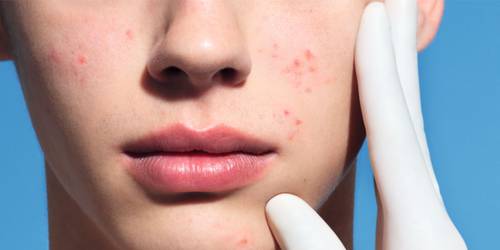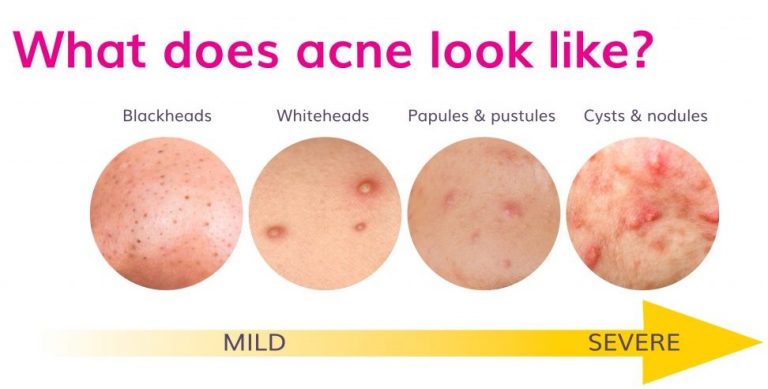Acne Management

By Ms Lew Hui Li & Ms Chong Hui Ying
Acne or acne vulgaris is a skin condition that occurs when a pore get clogged with dead skin cells, oils and a type of bacteria called Propionibacterium acnes (P. acnes). Acne is triggered by many factors:
- Hormones
- Stress
- Poor hygiene
- Wrong skin care products
- Sun
- Unhealthy diet

Non Inflammatory Acne Types (Less severe)
Usually do not cause swelling and are not painful.
Examples: Whiteheads/Close comedones; Blackheads/Open comedones
Inflammatory Acne Types (More severe)
It is more likely to cause complications such as scarring or pitting.
Examples: Papules; Pustules; Nodules; Cysts
Treatment- Mild Acne
Mild acne can be treated with over-the-counter (OTC) medications, such as gels, soaps, pads, creams, and lotions, that are applied to the skin. OTC acne remedies may contain the following active ingredients:
- Resorcinol: helps break down blackheads and whiteheads
- Benzoyl peroxide: kills bacteria, accelerates the replacement of skin, and slows the production of sebum
- Salicylic acid: assists the breakdown of blackheads and whiteheads and helps reduce inflammation and swelling.
- Retin-A: helps unblock pores through cell turnover
- Azelaic acid: strengthens cells that line the follicles, stops sebum eruptions, and reduce bacteria growth.
Treatment- Moderate Acne
A skin specialist, or dermatologist, can treat more severe cases.
- Corticosteroid injection: help prevent scarring, reduce inflammation, and speed up healing.
- Oral antibiotics: combat the growth of bacteria and reduce inflammation, erythromycin and tetracycline are commonly prescribed for acne
- Oral contraceptives: help control acne in women by suppressing the overactive gland.
- Topical antimicrobials: reduce P. acnes (example: clindamycin)
- Retinoic acid derivatives: unclog pores and prevent whitehead and blackhead from developing (example: adapalene, tretinoin)
Prevention and Management Tips
|
DO |
|
STAY HYDRATED This doesn’t just mean drink a lot of water. Must use a suitable moisturizer
to keep skin hydrated. |
|
KEEP GOOD HYGIENE Wash your pillow cases and clean spectacles regularly as they collect sebum
and skin residues. Also must wash hands before touching your face. |
|
TAKE HIGH FIBER FOOD Green leafy vegetables, nuts, fish rich in omega 3 fatty acids are helpful in
acne. |
|
USE SUNSCREEN Sun, heat and humidity can cause oil glands to be overactive which lead to
breakouts. Must choose oil free non-comedogenic physical sunscreens. |
|
CONSULT A DERMATOLOGIST
OR PHARMACIST Expertise of medical professionals can help to uncover source of acne and
develop a treatment plan that best suitable for you. |
|
DON’T |
|
NEGLET YOUR HEALTH Maintaining good mental and physical health always contribute to more
healthier skin. |
|
OVER CLEANSE Wash your face not more than twice each day by using mild soap. Over-cleanse
it or using facial cleanser with strong cleansing effect will strip your
face. |
|
TAKE HIGH GLYCEMIC INDEX
DIET Food rich in sugar, carbohydrate and milk is known to increase acne. |
|
PICK, POKE OR POP This will increase the risk of infections, scarring and make your acne take
longer to heal.
|
|
DITCH MEDICATION TOO
SOON It can takes up to 8 weeks before some prescribed medication has an effect on
your acne. Therefore it’s important to resist the urge of quit the medication
too soon. |




